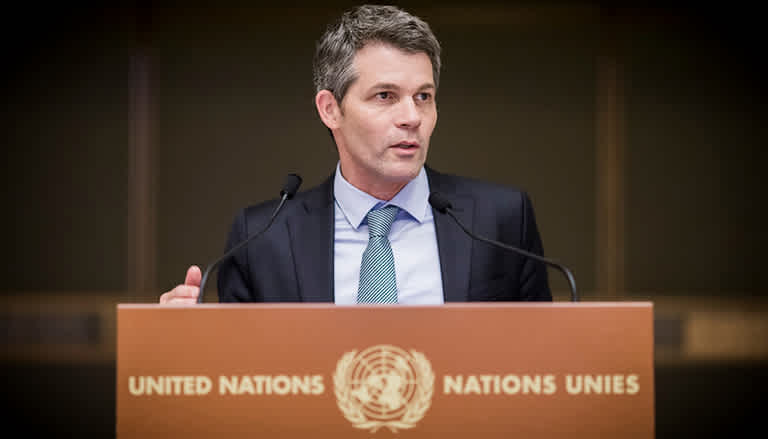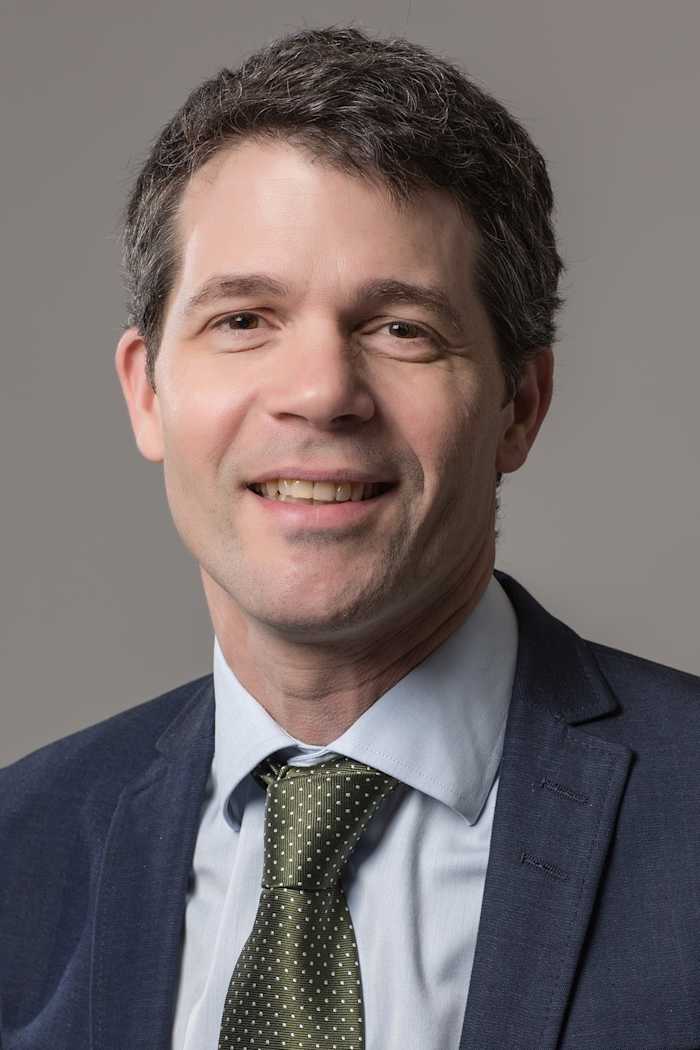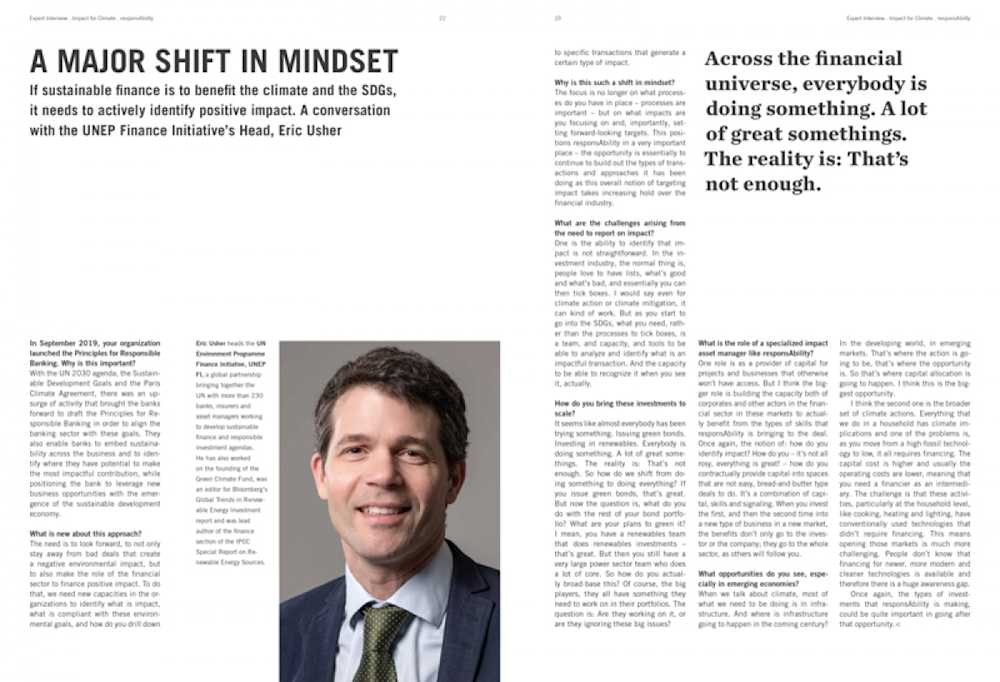Climate finance
A major shift in mindset

If sustainable finance is to benefit the climate and the SDGs, it needs to actively identify positive impact. A conversation with the UNEP Finance Initiative’s Head, Eric Usher
In September 2019, your organization launched the Principles for Responsible Banking. Why is this important?
With the UN 2030 agenda, the Sustainable Development Goals and the Paris Climate Agreement, there was an upsurge of activity that brought the banks forward to draft the Principles for Responsible Banking in order to align the banking sector with these goals. They also enable banks to embed sustainability across the business and to identify where they have potential to make the most impactful contribution, while positioning the bank to leverage new business opportunities with the emergence of the sustainable development economy.
What is new about this approach?
The need is to look forward, to not only stay away from bad deals that create a negative environmental impact, but to also make the role of the financial sector to finance positive impact. To do that, we need new capacities in the organizations to identify what is impact, what is compliant with these environmental goals, and how do you drill down to specific transactions that generate a certain type of impact.
Why is this such a shift in mindset?
The focus is no longer on what processes do you have in place – processes are important – but on what impacts are you focusing on and, importantly, setting forward-looking targets. This positions responsAbility in a very important place – the opportunity is essentially to continue to build out the types of transactions and approaches it has been doing as this overall notion of targeting impact takes increasing hold over the financial industry.
“Across the financial universe, everybody is doing something. A lot of great somethings. The reality is: That’s not enough.”

Eric Usher heads the UN Environment Programme Finance Initiative, UNEP FI, a global partnership bringing together the UN with more than 230 banks, insurers and asset managers working to develop sustainable finance and responsible investment agendas. He has also worked on the founding of the Green Climate Fund, was an editor for Bloomberg’s Global Trends in Renewable Energy Investment report and was lead author of the finance section of the IPCC Special Report on Renewable Energy Sources.
What are the challenges arising from the need to report on impact?
One is the ability to identify that impact is not straightforward. In the investment industry, the normal thing is, people love to have lists, what’s good and what’s bad, and essentially you can then tick boxes. I would say even for climate action or climate mitigation, it can kind of work. But as you start to go into the SDGs, what you need, rather than the processes to tick boxes, is a team, and capacity, and tools to be able to analyze and identify what is an impactful transaction. And the capacity to be able to recognize it when you see it, actually.
How do you bring these investments to scale?
It seems like almost everybody has been trying something. Issuing green bonds. Investing in renewables. Everybody is doing something. A lot of great somethings. The reality is: That’s not enough. So how do we shift from doing something to doing everything? If you issue green bonds, that’s great. But now the question is, what do you do with the rest of your bond portfolio? What are your plans to green it? I mean, you have a renewables team that does renewables investments – that’s great. But then you still have a very large power sector team who does a lot of core. So how do you actually broad-base this? Of course, the big players, they all have something they need to work on in their portfolios. The question is: Are they working on it, or are they ignoring these big issues
Invest in climate finance INVESTMENT PRODUCTS
What is the role of a specialized impact asset manager like responsAbility?
One role is as a provider of capital for projects and businesses that otherwise won’t have access. But I think the bigger role is building the capacity both of corporates and other actors in the financial sector in these markets to actually benefit from the types of skills that responsAbility is bringing to the deal. Once again, the notion of: how do you identify impact? How do you – it’s not all rosy, everything is great! – how do you contractually provide capital into spaces that are not easy, bread-and-butter type deals to do. It’s a combination of capital, skills and signaling. When you invest the first, and then the second time into a new type of business in a new market, the benefits don’t only go to the investor or the company; they go to the whole sector, as others will follow you.
What opportunities do you see, especially in emerging economies?
When we talk about climate, most of what we need to be doing is in infrastructure. And where is infrastructure going to happen in the coming century? In the developing world, in emerging markets. That’s where the action is going to be, that’s where the opportunity is. So that’s where capital allocation is going to happen. I think this is the biggest opportunity. I think the second one is the broader set of climate actions. Everything that we do in a household has climate implications and one of the problems is, as you move from a high-fossil technology to low, it all requires financing. The capital cost is higher and usually the operating costs are lower, meaning that you need a financier as an intermediary. The challenge is that these activities, particularly at the household level, like cooking, heating and lighting, have conventionally used technologies that didn’t require financing. This means opening those markets is much more challenging. People don’t know that financing for newer, more modern and cleaner technologies is available and therefore there is a huge awareness gap. Once again, the types of investments that responsAbility is making, could be quite important in going after that opportunity.

This article was originally published in Impact for Climate, the responsibility Impact Report 2019. Find the entire publication here: